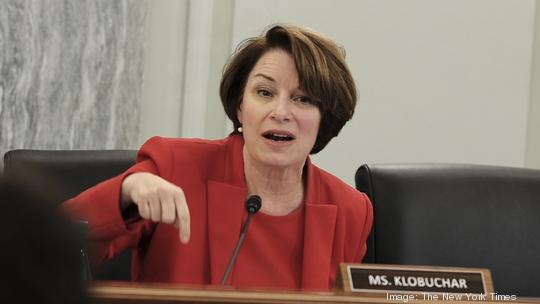
The tech industry in the Bay Area is divided on a new antitrust bill that seeks to rein in the biggest companies in the business.
Introduced in the U.S. Senate, the American Innovation and Choice Online Act would prohibit tech giants such as Apple Inc., Google LLC and Meta Platforms Inc. from either giving their own services a leg up on their platforms or harming the ability of rivals to compete on those platforms.
Many local companies and investors see the bill as a way of checking the power of the industry's behemoths and leveling the playing field for startups and smaller competitors. Y Combinator, Patreon Inc. and 41 other companies and investors this week posted an open letter in support of the bill.
"Anyone with knowledge of the issue will recognize how important the passing of this bill is," said Garry Tan, a managing partner at Initialized Capital, one of the companies that signed the letter.
But other companies and industry groups stand firmly against the American Innovation and Choice Online Act. On Thursday, a group of 25 business associations including the Silicon Valley Leadership Group and San Francisco-based tech advocacy organization sf.citi announced their opposition to it and sent a letter to the U.S. Senate and the House of Representatives expressing their concerns.
"Silicon Valley companies and entrepreneurs have been a key pillar for the state's growth and strength during the pandemic," SVLG CEO Ahmad Thomas said in the announcement. "The proposed legislation could stifle the Golden State’s innovation."
The bill has bipartisan support
Although it's sponsored by Democratic Sen. Amy Klobuchar of Minnesota, the American Innovation and Choice Online Act is a rare thing in Washington these days — something with bipartisan support. Including Klobuchar, equal numbers of Republicans and Democrats have signed on to the bill, reflecting the growing concern on both sides of the aisle about the power of the Big Tech companies. The legislation follows the filing of antitrust lawsuits by government regulators against Google (Nasdaq:GOOGL), Facebook owner Meta (Nasdaq:FB) and Amazon.com Inc. (Nasdaq:AMZN).
The bill would apply to companies with at least 50 million monthly US users or 100,000 monthly US business users; a market capitalization or annual sales of more than $550 billion; and the power to restrict other companies' ability to interact with consumers on a platform that the tech giants control. In general, the bill would bar such companies from preferencing their own services on their platforms, from harming other companies' ability to offer their services on those platforms, and from enforcing their terms of service differently against different users in a way that would hinder competition.
Eric Migicovsky is intimately familiar with the power of the Big Tech companies. Now the head of Beeper Inc., Migicovsky was previously the founder and CEO of Pebble Technology Corp., an early developer of smart watches.
Pebble put a lot of effort into getting its devices to work with different smartphones. But it had particular trouble getting them to work with iOS, the operating system that underlies Apple's iPhone, Migicovsky said. That was particularly the case after Apple (Nasdaq:AAPL) released the Apple Watch, he said.
"Competing with the Apple Watch on their home turf was very hard, because Apple controls the operating system, and they control access to many of the services that are deemed essential, for example, iMessage," Migicovsky said. "We tried hard to get Pebble to function in a similar way to the Apple Watch, but it was impossible."
Some founders oppose "walled gardens"
That experience led to Beeper's support for the American Innovation and Choice Online Act. The bill would help ensure the interoperability of devices and services, Migicovsky said. It would prevent companies like Apple from making it so their own products work better with each other than they do with third-party ones, he said.
"The biggest tech companies in the world have created these walled gardens, these private siloed networks," Migicovsky said. He continued: "That's totally against the initial idea of the Internet, which is this open, collaborative, interoperable network."
But others in and around the tech industry oppose the bill.
SVLG, which counts Amazon, Apple, Microsoft Corp. (Nasdaq:MSFT), Meta and Google as members, is against the bill because it's vague and doesn't offer a clear definition of what it means for a company to preference its own services, said Peter Leroe-Muñoz, the group's general counsel.
"Platforms might simply say, 'In order to avoid the self-preferencing issue with competing companies in our platform, we simply might exclude all third party competitors from our platform,'" Leroe-Muñoz said. "Obviously, that's bad for consumers, because now consumers now have a whole lot less choice."
Some say consumers aren't being harmed
The Department of Justice and the Federal Trade Commission already have tools to address anti-competitive behavior, he said. Congress doesn't need to write new laws for that, he said.
And it's not clear that there's even a problem, Leroe-Muñoz said. For the last 40 or so years, antitrust enforcement has been focused on how an alleged lack of competition affects consumers, particularly on the prices consumers pay. If you focus on that, it's hard to argue that consumers are being harmed by the Big Tech services.
"Consumers are doing better than they ever had before when it comes to no-cost or low-cost online services," he said.
Google LLC also opposes the American Innovation and Choice Online Act and other proposed antitrust legislation. It also cited vagueness as part of its reason why.
"The vague and sweeping provisions of these bills would break popular products that help consumers and small businesses, only to benefit a handful of companies who brought their pleas to Washington," it said in a statement.








